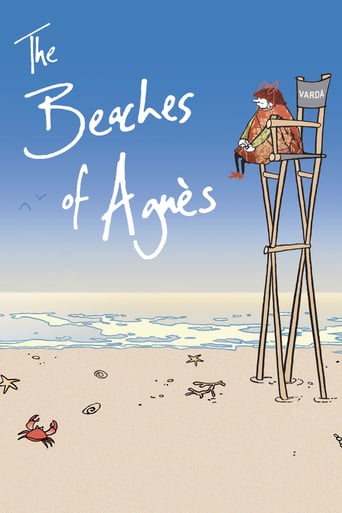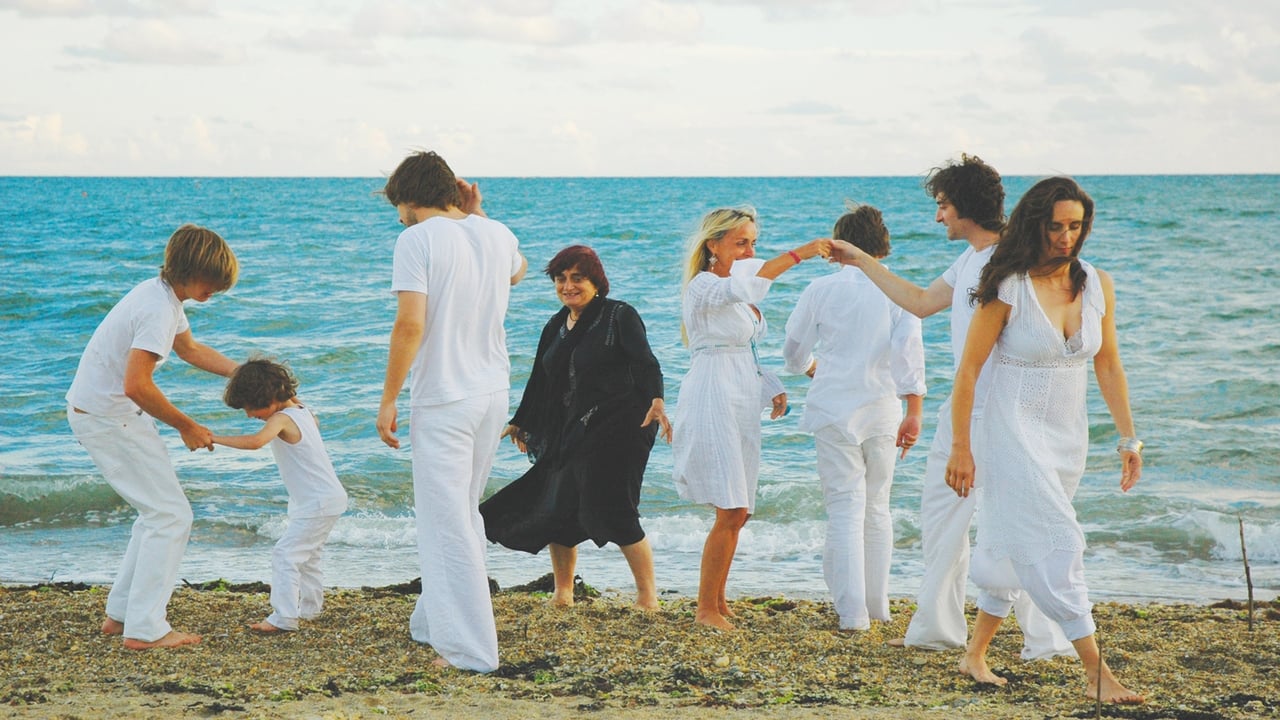tomgillespie2002
French New Wave film-maker and photographer Agnes Varda takes a look back at her life, her career, and her loves. She tells her story mostly to camera, now 80 years old - "a little old lady, pleasantly plump" - and is still full of life and wonder. She starts with her time studying art in Ecole du Louvre, the charms of the small town near Paris where she made her first film, her relationship with and love of fellow film- maker Jacques Demy, and the beginning of the French New Wave movement, and moves on to her re-location to and seduction by Hollywood, the hippy movement, her neo-Feminist views that influenced her films, and her move into photography. Most of all though, she reminisces about the eccentrics she encountered, and the photographs that immortalise her memories.Varda seems extremely keen to cement these memories either by recording them on her ever-present video-camera, or by taking pictures. It is important to remember, it seems. She uses a number of different artistic techniques in the film. Her wonder and love of the beaches are evident at the beginning as she lays out a number of old photographs in the sand that blow in the wind, as she reminisces. She also lays out a number of mirrors facing all angles and directions, creating some fascinating images. Varda has a clear love for art, and sees it in everything she does. As she watches a man gaze out to sea, she describes him as being like Ulysses. It is clear that it is Varda herself who is like Ulysses - life has been an epic journey for her, in which she has encountered many friends and characters, and the sea is like her life, vast and beautiful, but fading into the distance.What is so joyous about the film is how wonderfully sentimental it is. It is not patronising or forceful by overplaying sad music or having Varda cry into the camera, but instead the beauty and the melancholy are in her words, and how she describes the first time she met Demy, or how she turned a run down alley full of empty picture frames and overhanging trees into a beautiful gateway. It is so beautifully sad yet ultimately uplifting. Varda is a wonderful and intelligent lady who's love of art and creativity shines through what appears to be a short woman with a strange haircut. Less a documentary, and more of an exploration of art, love and life seen through the eyes of a woman who has lived through the very heart of it. Lyrical, beautiful, and reminds you of the true joys to be found in cinema.www.the-wrath-of-blog.blogspot.com
valadas
Agnès Varda presented us in this autobiographical movie with her memories of a life devoted to the cinema and not only. She does that in powerful and beautiful images supported by a brilliant, witty and sensitive commentary. In this movie we can see references to several of some of the best Varda's films such as La Pointe Courte, Cléo de 5 à 7 and Le Bonheur, with images, and to some of the greatest and more important figures of French cinema such as her husband Jacques Demy to begin with and also Godard, Catherine Deneuve, Michel Piccoli, Jane Birkin and others. The cut is very intelligent and effective in visual terms combining the present and the past sometimes in simultaneous images with a special effect here and there. A masterpiece indeed.
utzutzutz
Granted, I am a huge fan of Agnès Varda's work—and persona. I've seen most of her American releases, which are, unfortunately, far fewer than the 46 films she's directed. Sorry to report that even Netflix only stocks 8 of her films; my local video store and library system, not even 1.Eighty-one-year-old Varda is, first and foremost, a poet who happens to be holding a video camera. And with this, her autobiography, she quickly brings us into the stream of consciousness of her brilliant mind, regaling us with both fantastic images, filmic experiments, and words rendered so quietly and sweetly that it belies their utter veracity. With the fluidity of a Russian ballerina, she weaves still photos, clips from her films, present- day documentary footage, and fictional re-creations.A viewer with a familiarity of her oeuvre will obviously take away greater understanding and enjoyment of this recounting of her life and work. Yet, I believe it's accessible even for the uninitiated, as a tribute to an artist and iconoclast who sustains a strong vision and keen insight into life and art. And a great big heart." 'If we opened up people, we'd find landscapes.' If we opened up me, we'd find beaches," she begins, an apt conceit for the half-Greek filmmaker who has lived her life near the sea. And thus, in the film's opening shots, she constructs a web of mirrors propped on easels in the sand, reflecting the incoming waves. These are fancy, gilded, furniture mirrors, large and small, capturing both la plage and Varda's reflection as she begins the narrative of her childhood. In and of itself, it's a beautiful installation piece—greatly enhanced by the reflexive quality of a sea of cameras filming themselves. Moments later, she sets up family photos on blades of grass in the sand. While discussing an image of herself and her sister in their bathing suits, two little girls appear in current time, wearing the same sorts of suits. "I don't know what it means to re-create a scene like this. Do we relive the moment?" Varda wonders. But her answer seems less about reconstructing the past (this is not a wistful film like Bergman's Wild Strawberries), but more about delight in her powers as a magician with a camera. "For me, it's cinema, it's a game," she says.Some of the film's sweetest moments derive from shots of her family—her two children and late-husband, fellow New Wave auteur Jacques Demy (The Umbrellas of Cherbourg). She obviously has great affection for the "peaceful island," as she describes them. In one lovely scene, the extended family is dressed in white gauze, frolicking. "Together they're the sum of my happiness. But I don't know if I know them, or understand them. I just go toward them."Varda employs an unusual technique of re-creating the major moments of her life/films while bringing her current self into the proceedings. In the age of social networking a la Facebook, with gambits toward entering the past as we simultaneously dwell in the present, this seems a very contemporary notion. With the gift of memory, we both do and don't inhabit all of the times of our life at once. As she states, "I live. And as long as I live, I remember."One of La Varda's most lovable traits is how utterly herself she can be. Her 8-decade-old hair sports its trademark bowl cut, yet in some scenes is colored almost parfait-like (sans cerise) with white on top and deep red around the ends—gloriously unconventional, and wry. And indeed her sense of humor is continually present. She also has the good sense not to take herself completely seriously. After revisiting her early home in Brussels and discovering that it is now inhabited by an avid train enthusiast who prattles on about his collection, she concludes, "The 'childhood home' part was a flop."In 55 years of making films, the director has clearly spent ample time pondering the art of her craft. As she notes, "I think I've always lived in it." This is obviously so, and without traditional tutelage. She claims to have made her directorial debut, La Pointe-Courte, after having taken in just 10 films in her first 25 years. This greatly flouted convention within French film-making of the time, in which training and credentials were paramount. Much of the film concerns images and the context of their creation— the process of birthing, what prompts images into being, the results of their existence, the ripple effects of the filmmaker's art, and the inextricable link between maker and film.Although Varda includes reenactments in this walk backward, she also allows the viewer to be in on their making. It's as if she hopes to underscore the artifice and revels in the fact that we will knowingly suspend our disbelief anyway. In one scene, she sets up a production office atop sand dumped on a city street.The movie's final scene reveals Varda's "shack," a studio she's recently built on the beach. The filmmaker-as-architect metaphor made real, its walls are constructed of strips of celluloid from a 1966 film in carefully chosen colors, bathed in light. The structure is fragile yet appears solid. This is a wondrous metaphor, one that seems to encapsulate the artist's spirit and life. "In here, it feels like I live in cinema," she notes.
jotix100
Agnes Varda, one of the most original women directors, bar none, is at it again. We were quite impressed by this film, which is not a biography, but in which Ms. Varda takes us on a tour of her life. She has always been admired for her films, but this account is almost a confession she makes to us, her audience. Islands have been a close subject for her, and so we are shown parts of her life where she has been closely tied to these places in the sea."Les plages d'Agnes" serves the director to take us along for a magical ride in which reveals some things that one never knew about her, as well as she goes over some parts of her life we already knew. Her life with Jacques Demy and their work is often seen at different moments of their distinguished careers. The revelation of her husband's death from AIDS must have weighed heavily on her. Such a vital man to succumb to that disease is hard to imagine and one can only feel for what Agnes went through in that ordeal.In spite of her age, Agnes Varda shows an amazing amount of energy. She sets most of the narrative on a beach in which she lets her imagination go wild with the possibilities she can create from the elements she uses. She is also seen rowing on the Seine near the Pont Neuf, a bridge that she feels a connection to.Some snippets of her big hits are shown, like the immensely satisfying "Cleo, from 5 to 7", and "Vagabund", just to mention two. She is kind to the artists she has enjoyed working with. She gave the great Phillipe Noiret his start in the French cinema. She is also generous to other people that have done great things in the French industry like, Resnais, Truffaut, Chabrol, Godard, Demy, and Rivette, among others.Funny that Ms. Varda was born not in France, but in Belgium. She made her home in the country which welcomed her. There is a sequence in which we see her and her family doing a kind of a slow dance on a beach that has to be one of the most moving moments for this viewer. This film is highly recommended even for people that have not seen Ms. Varda's previous work. She wins us over just by being herself.


 AD
AD



